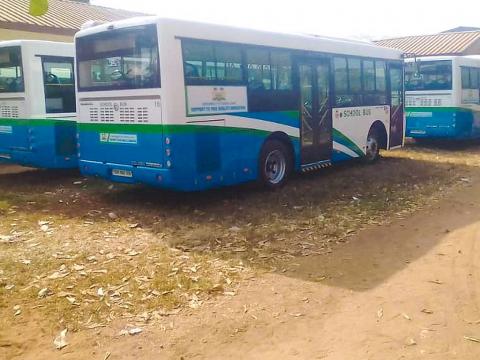By Francis Murray and Prince Musa in Kenema
School bus services have been halted across the country due to the inability of the authorities to management them, leaving students struggling to get to school.
The services have been halted specifically in Bo, Kenema and Freetown, at least for the last one week, Politico learnt.
The buses were bought and supplied to district and city councils across the country by the Sierra Leone Government to ease the transportation challenges of school pupils, as part of implementation of the Free Quality Education porgramme.
Our investigation show that the common cause associated with the current situation is their high running cost.
A student of the Freetown Secondary School for Girls told Politico on Monday that since the buses stopped running, she had been forced to wake up as early as 5am to get to school.
“Although the coming of these buses has eased transportation in many ways, today has been worse than at any time,” she said.
“This situation means that we must wake up as early as 5am to make it to bus stations where the usual fighting for public transportation is the order of the day,” she added.
In August last year the Ministry of Transportation bought 50 buses from China. Some 47 of them were distributed to all 16 districts across the country. Bo received five buses, Kenema four and Freetown 12.
All 21 buses in these cities have now been grounded. In Freetown, the city council said running the buses had added a serious financial burden on it.
“It turns out that the money that we generate on a weekly basis is not sufficient to manage the buses,” Festus Kalay, Chief Administrator at the Freetown City Council, told Politico.
“We spend around twenty-three million eight hundred thousand leones per week to purchase fuel. So, if you look at what comes into our account is just about twenty-one million leones. So meaning there's a shortfall of Le2.8 million to provide fuel. So we've been using our own sourced revenue to even pay drivers, all twenty four drivers. We've been using our own sourced revenue to print out tickets, we have been using our own sourced revenue to pay the conductors,” Kalay explained.
In Kenema the deputy Chief Administrator, Mohamed Vandi, blamed the situation on the shortage of fuel this week. But he also said that the high running cost was a major factor.
‘’We run the buses not on cost recovery basis but free services, because the income collected from pupils does not even buy fuel for two buses per day,’’ Vandi said.
Council authorities in Kenema say they pay Le 8 million as salary to each bus team; which include two drivers and a conductor. The city has four school buses.
Politico understands that in September last year the Ministry of Transport negotiated Le1 million as salary per driver.
In Kono and Pujehun the buses have been running so far.
But last November the Communication Officer of the Koidu New Sembehun City Council, Martin Benedict Kaindeh, told Politico that they had to sack three of the six drivers they had for their three buses and renegotiated the salary of the other three, from Le 1 million to Le 750,000.
The Pujehun Council authorities say they have had to make special arrangement to keep their buses running. Chief Administrator, Mohamed Araphan Kabba, said they have solicited funds from the Council to ensure that the buses were running.
“We told the council to support us untill government comes in. I even spoke to the Deputy Minister of Transport and they are even planning to reimburse Council,” Kabba said in an interview on Wednesday.
Pujehun has only two buses.
Also last year, the Bo City Council told Politico that they had to go into other areas to fund the running cost of the buses.
The Chief Administrator, Edward Alpha, was worried back then that this could not be sustained.
All five buses in Bo have not been running since school reopened a week ago.
In Freetown, the Council authorities say they have written to the government to consider the possibility of subvention for the service.
‘‘What the Mayor decided to do was to officially write the ministry of finance and our parent ministry - local government and of course copy the ministry of transport, that we're kind of constrained. And if we're to continue managing these buses, it means central government must chip in by giving out subsidy or subvention. The letter was writing I think around November or December last year, but then we did not get any early response from the ministry,’’ Kalay said.
Kalay said a meeting was held on Wednesday which was attended by officials from the Ministry of Transport, Local Government and Finance. He said the situation could be resolved by next week.
And the students are anxious.
“The government should try to look into this matter as earlier as possible if they truly care about our welfare as pupils’’ an Albert Academy student told Politico.
Copyright © 2020 Politico Online









